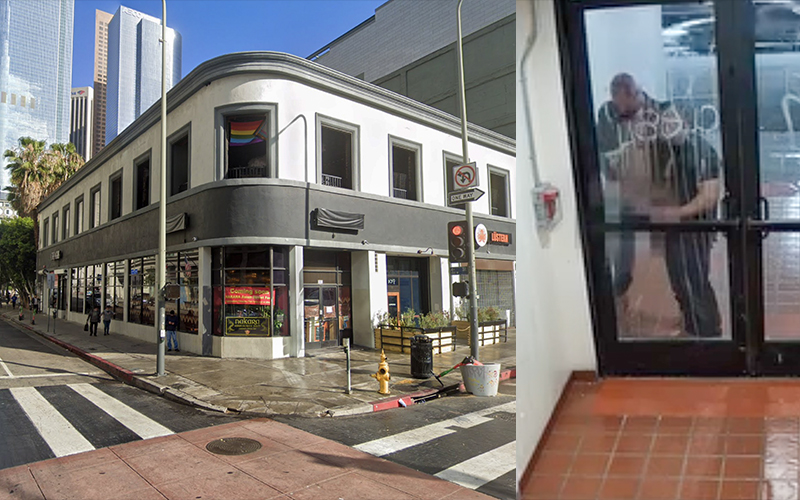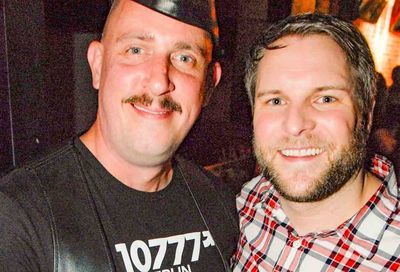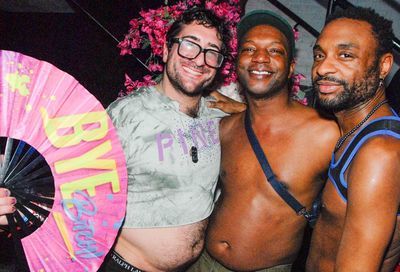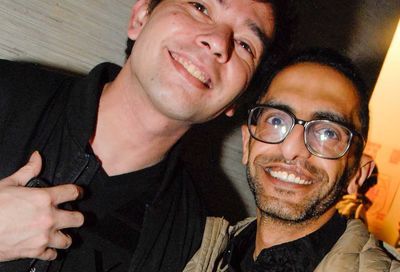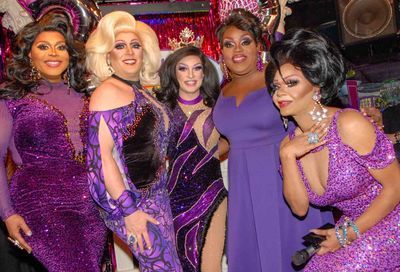Rep. Robert Garcia is the Next-Generation Congressman
Robert Garcia, Congress's first out LGBTQ immigrant, on how Democrats should respond to the current political climate.

“I always tell people that I am gay, I’m a politician, I’m an educator, but the thing that defines me the most is my immigration experience,” says Congressman Robert Garcia. “That makes me more ‘me’ than anything else.”
The 45-year-old California Democrat — who recently made history as the first openly gay immigrant elected to the U.S. Congress — has been profoundly shaped by his early life experiences, immigrating from Peru at age five with his extended family and growing up in a working-class household, surrounded by other immigrant families, in the San Gabriel Valley of Southern California.
“We came to the U.S. in search of the American Dream and trying to improve my family’s situation,” Garcia says during an hour-long sitdown in his new office in the Longworth House Office Building on Capitol Hill. “In Peru, in South America in general, it was a rough time. So we came on a mission to improve our lives.
“I learned to have an incredible work ethic as an immigrant,” he continues. “I learned from seeing my mom, early on, cleaning houses, then moving on to clear clinics, and then becoming a nurse’s assistant.
“I also gained this incredible sense of American patriotism through my immigrant experience. I tell people all the time that immigrants are some of the most patriotic people in this country. My mom would always tell us to be thankful for being here in this country, to honor this country for welcoming us, and to give back, and work hard for the chance to be here. And I’m just very grateful to her and for instilling those values in me and in my brother.”
Garcia says what concerns him, in recent years, is the large-scale emergence of a more self-serving, jingoistic, and nativist view of patriotism that is rooted in sloganeering and a narrow view of who is “deserving” of the rights and privileges of American citizenship.
“Patriotism is not individualism, and it’s not screaming ‘America First,'” he says. “Patriotism is about helping people and helping your neighbor. I always tell a lot of my friends and Democrats in Congress that we have to reclaim what patriotism actually means. The true patriots in this country are the folks that are at food banks, that are helping people that are unhoused, that are supporting kids in afterschool programs.”

After graduating high school, Garcia became the first person in his family to attend college, matriculating at California State University at Long Beach, where he joined the Delta Chi fraternity and served as its president before ultimately being elected president of the university’s student body in his senior year. Near the end of his undergraduate studies, Garcia also gained American citizenship.
“Serving as president of my fraternity was my first little taste of helping, doing community events, doing good stuff,” he says. “By my last year of college, I knew that I liked helping people and I liked doing what I could to improve the campus. So I graduated, went to grad school at the University of Southern California in Los Angeles, and then I went back to get a doctorate in higher education.”
Garcia later served as a public information officer at Long Beach City College, and taught classes in communication and public policy at various colleges in the greater L.A. area. In 2007, he co-founded the Long Beach Post, a website devoted to local news and sports reporting, recusing himself from editorial duties when he ran for Long Beach City Council.
In 2009, he was elected to represent much of the city’s downtown area, serving for five years before being elected as mayor of Long Beach in 2014. After serving two terms, he ran for an open congressional seat last year in a newly redrawn district representing his hometown, winning the election with over 68% of the vote.
While Garcia is now a Democrat, his first forays into politics were as a Republican. He previously founded the Long Beach Young Republicans, and worked as the California Youth Coordinator for George W. Bush’s first presidential campaign. He also worked as chief of staff for Long Beach Councilman Frank Colonna, a Republican who unsuccessfully sought the mayor’s office in 2006.
This led many critics, at the time he first sought office, and subsequently, during his mayoral run in 2014, to accuse him of political opportunism, having only changed his party affiliation in 2007, at age 30, and just two years before being elected to the Council in an overwhelmingly Democratic-leaning city.
But Garcia says he — and his entire family — underwent a political evolution, initially starting out as Republicans due to their love for Ronald Reagan, whose decision to sign a sweeping immigration bill in 1987 gave his family a path to legal citizenship.
“The last immigration bill that passed Congress was the Ronald Reagan Bill in the 1980s,” he says. “So my family loved Ronald Reagan, and everyone in my family was so grateful — as were immigrants from South America that came during that time — and Ronald Reagan was the president. We didn’t know a lot about politics obviously, but we did know that Ronald Reagan was the president that got us the amnesty citizenship bill, signed it and supported it. It’s the one great thing he did.
“So my whole family became registered Republicans: me, my mom, my dad. Everyone in my family became Republicans because we loved Ronald Reagan. And then, obviously, after a period of time, which pretty much aligned with me coming out and realizing what my own identity was, I eventually switched parties.
“I think oftentimes, when you’re gay or you’re queer, you’re creating facades of who you are and you’re never really your true self. It takes you a while to figure out who your true self is. And I always like to say I’m grateful that not only I became a Democrat, but everyone in my family eventually became Democrats, and are to this day.”
Garcia’s decision to run for Congress was motivated, in part, by a desire to push back against misinformation and false narratives that he felt were being promoted by members of Congress, especially those most loyal to former President Donald Trump. When former U.S. Rep. Alan Lowenthal retired and his old congressional district was redrawn, Garcia saw his chance to take on those fights at the national level.
“I strongly believe that if we don’t fight really hard at this moment, we could lose our democracy in the next 10 years,” he warns. “This is a unique moment in American history. There are folks in Congress and in our state houses who literally want to transition us into becoming an authoritarian government.
“There are folks that know — deep down, of course — that President Biden won the election, but won’t actually verbalize it or admit it to their constituents, because they would rather have power and give tax breaks to their billionaire friends. I think that there’s a coordinated attack on our institutions, on the government, on the media. And we’ve got to consistently push back and fight.”

METRO WEEKLY: Let’s talk about your coming out process. When did you first have an inkling you were gay, and how did that understanding develop over time?
U.S. REP. ROBERT GARCIA: I think in high school. I just didn’t know what was going on. I had girlfriends. My first long-term girlfriend ended up, the year after, becoming the homecoming queen. She’s so sweet. We’re still in contact. And so I had girlfriends in high school and in college, but it wasn’t really until I got to college that I kind of figured out, ‘Oh, this is definitely different.’ I had my first [gay] experience in college, and you start having those moments where you realize a little bit more about yourself. And I think that’s what happened for me.
So I didn’t really come out until after college, but during that time, I met my first gay friends. Even though we were all closeted, we all kind of found each other somewhere in the fraternity — even though the fraternity was overwhelmingly straight. But there were a couple of us that found each other. And then we met other people.
MW: Who was the first person you told you were gay?
GARCIA: I don’t know that it was a moment where I told someone. It was more like a gradual coming out with different friends that I trusted, who I began to share with. I never really came out to them, I just kind of eased into it, with a lot of folks. There was never really a sharing moment. It was always just experiences, or friends or girlfriends of mine realizing, “It’s okay, we get it.” So that’s kind of how it happened.
The first person I really remember verbalizing my feelings to was my mom. I don’t remember verbalizing it to anybody else. I remember, because we were at a Chili’s. And after I told my mom, within a week or two, I told my dad. And everybody was so very supportive. I didn’t have that experience, gratefully, where people were upset. We’re a Catholic family, but —

MW: Do you still consider yourself Catholic?
GARCIA: I do. I certainly have my own personal challenges with the Church, but I do consider myself a person of faith, and I do consider myself Christian and Catholic.
MW: You’re obviously married to a man. How did you meet your husband?
GARCIA: It was the Fourth of July. I wasn’t actually going to go out, but my friends were like, “Let’s go to West Hollywood.” And we went to a big club, which is not there anymore, called The Factory in West Hollywood.
I saw him — we kind of connected on the dance floor. He was traveling on vacation from the Bay Area. We met and exchanged numbers. And then from there, we kind of dated long-distance for a good period of time, for a couple years, probably. We dated for about 10 years. Part of it was long distance. He ended up coming to grad school at USC, so he moved down here. And that’s really when we started getting more serious. We eventually married on December 22, 2018.
MW: How do you achieve a balance between your personal and professional lives as a congressman who travels back and forth between your district and Washington?
GARCIA: You just make it work. I’m home every weekend. I plan on being home every weekend. My home is Long Beach, I just work here. And that also allows me to center myself and be able to spend time with my family and my friends back home. I think I’ve got a good rhythm going. I get home as soon as I can, work hard when we’re back home, spend plenty of time with the family and my cat and my friends back home.
MW: Does your husband come to D.C., or is he primarily based in Long Beach?
GARCIA: He’s a professor at the university, and so he teaches. And so I travel home from D.C., and he watches the cat at home. [Laughs.]
MW: What do you do for recreation or to relax when you’re not working?
GARCIA: I read trade paperbacks or comics. I’m a big comic fan. I love pop culture. I love watching movies. I love watching RuPaul’s Drag Race, and I’ve seen not just every season, but every version — even international versions. I like to go out and have fun. I haven’t experienced too many of the bars in D.C. yet. Before I was in Congress, definitely, I’d been to a lot of the bars. Some of the bars I used to go to in D.C., when I’d travel here before I was elected to Congress, are closed. I used to go to Cobalt, but that’s closed. I have been to Green Lantern a couple of times. I’m going to go back. I’ve been asking friends for recommendations.

MW: Regarding your love for comic books, you’ve previously spoken about loving Superman, and said you were so excited to go to D.C. and see the first issue housed in the Library of Congress. What is it about comic books that appealed to you, both as a child and as an adult?
GARCIA: Comics helped me learn English when I was young. I only spoke Spanish when I first got here. So I used to love going to the local thrift shops or little pharmacies where you could get comics off the rack. And then, later on, I graduated to comic book stores. But that really helped me read, and taught me a lot about American culture and English. So that’s really why I loved comics. My family supported me getting them, because it was helping me acclimate to the language.
The hero that really spoke to me as a young kid was Superman. I felt like I just related to him. And thinking back and unpacking why I related to him as a kid, it was because he was a strange visitor from another planet. That’s who I was. As I got older, I realized, “Oh, he also has a secret identity,” hiding who he really was, which is what I was doing because I was still closeted.
And so I think I related a lot to this idea of a secret identity, as well as to this kind of American ideal of defending “Truth, Justice, and the American Way,” and being honest. Early on, I wanted to be a journalist. And so there was just a lot of appeal to the character of Clark Kent/Superman, particularly as an immigrant from another place. So Superman has always been my favorite character. I like a bunch of characters, but he’s what I gravitated towards.
MW: Are you more of a DC or Marvel man?
GARCIA: I appreciate and love both, but I’m more of a DC guy. I always have been, but I’ve seen every Marvel movie, every TV show. I have endless Marvel comics. And so I have loved both. I’ve actually been an X-Men fan for a long time, probably my favorite group of heroes in the Marvel universe.
MW: When you were first elected, even before you were sworn in, one of the things that stood out was your social media presence and your Twitter game, in terms of how you respond to people and memes you share, and specifically references to RuPaul’s Drag Race or other LGBTQ cultural phenomena. Have you gotten pushback because of the LGBTQ content you have posted to Twitter?
GARCIA: No. First of all, I do my tweeting myself. I’m gay. That’s me. I’m a huge fan of RuPaul’s Drag Race. I’m a fan of drag as an art form. The things I tweet about are just things that I find funny or reflect my personality. I’ve always been a very serious person, and professionally, and I continue to be. But I also express my personality on social media, and I am unabashedly gay.
Overall, it’s been actually very well received. Colleagues in Congress tell me all the time, “This is so funny. Where did you get that?” I think people get that. It’s just part of my personality, and it always has been.
MW: Recently, a straight ambassador for the Log Cabin Republicans was quoted as saying that if you’re gay and proud, that is incompatible with being a Christian and a conservative. She argued that gay people should feel ashamed and repent, even implying that showing or demonstrating pride in one’s LGBTQ identity is problematic. How do you feel about that sentiment, which is shared by many others in this country?
GARCIA: I totally disagree with that. Obviously, I am openly gay, but I don’t hide any part of who I am, even as a member of Congress, and I think that folks should be able to be themselves.
We have 10 LGBTQ+ members in the house. And I think that I probably represent a generational change, in that I’m part of a generation of folks who are more online and who grew up in the RuPaul’s Drag Race era and are well-versed in social media. I’m also into pop culture and other stuff. And so I’m not going to hide those parts of me just to fit into what a member of Congress “should” be like or whatever a government official “should” be like.
When I was mayor, I went to drag shows all the time. I’m going to continue to go to drag shows here in D.C. as a member of Congress. That’s just me. And people elected me, knowing the kind of person I was. I think it’s important for people to be who they are and be authentically themselves.
MW: The Democratic Party has been raked over the coals recently, particularly for its messaging to Latinos, but also to working-class people and immigrant communities. It may seem odd to some that people who flee despots and authoritarian regimes overseas would embrace a party or values or politicians who are trying to do the same things here, but yet the Democratic party seems to have fallen down in communicating effectively to those people. Why do you think that is, and how do you fix it?
GARCIA: First, I think it’s important to note that Latinos are overwhelmingly Democratic in this country. However, I think the party also has to prioritize issues for the Latino community. We should be ashamed that we haven’t passed comprehensive immigration reform — the last major immigration reform bill was in the 1980s. We’ve had opportunities to get something done, and we haven’t taken advantage of that. It’s been disappointing that we could have gotten an immigration reform bill done, and we chose to prioritize other things.
So I think that we owe to the Latino community to act on immigration now, and certainly when we’re able to win back the House. I think that Latinos still are a patriotic group of folks, particularly those with immigrant experiences. And so I think Democrats need to speak to that, and need to speak about love of family and a love of country, and [then we can tell them] that we’re going to focus on the issues that they care about, immigration, strong public education, and a good healthcare system.

MW: Is part of the problem also rooted in class issues? There are some who think that the Democratic Party has become the party of the wealthy elites and the professional-managerial class who have some financial capital and who could afford to work from home during the pandemic, for example.
GARCIA: There could be some of that, but I think, still, overwhelmingly, Latinos are aligned with the Democratic Party. I think that overall, the Democratic Party needs to continue to speak to working-class people and to remember that our roots are within coalition building and the labor movement and working-class folks taking on corporate power, and holding large corporations accountable.
When I talk to folks in my district — and my district is diverse, but has a very large Latino population — those are the issues that they care about. They want to know why this country continues to support billionaires and large corporations, and they want to know why we spend so much money on tax breaks for the very wealthy, and not investing in public schools. I think that they want to see action in those areas. And I think the Democratic Party has made really important strides, but there’s so much more structure that needs to change in the country. I think we’ll continue to do that.
MW: Is there also a messaging problem?
GARCIA: I continue to say that we’ve got to communicate more to Latinos, and in multiple languages, so in Spanish, too, to get the message out there. But that’s why I think it’s dependent on folks like me.
We just brought in the largest class of freshman Latinos in the history of the U.S. Congress, and I am the first LGBTQ immigrant elected to Congress. I feel like my responsibility is to speak to that community. And we’ve got to elect more folks that represent the country. As someone that is both an immigrant and gay, I think I have an opportunity to reach a segment of the population. I have a responsibility to do so.
MW: You were also elected a president of the freshman congressional class, correct?
GARCIA: Yes. I’m very honored.
MW: What are your responsibilities in that role? What are you expected to do, and what sort of things are you doing?
GARCIA: I represent our class of 35 amazing Democratic freshmen to party leadership. I kind of serve as the voice of the united class on a bunch of issues and at a bunch of meetings and forums. I’m also, in part, social director, and so I help plan a lot of events for the class.
And I’m tasked with getting information out to the class and providing updates, and the leadership goes through us for a lot of messaging and opportunities to engage the class on a bunch of issues. We’ve done everything from organizing a trip to the White House to meet the president, to meet-and-greets with Secretary Buttigieg, to just social gatherings.
MW: You have a number of freshmen on the Republican side too, one of those being George Santos, who has made history for being the first Republican LGBTQ non-incumbent ever elected to Congress. He has obviously had his own problems that have been detailed in the press, in terms of his alleged dishonesty and questions about his campaign finances. He’s stepped down from his committee assignments while a number of state and federal investigations are ongoing. Should he have to resign from Congress?
GARCIA: He should have resigned yesterday. The truth is that George Santos has no business being in Congress. Separate from his identity — who knows what it is, because he has multiple names, whether it’s George Santos, or Anthony, or Kitara or whatever — he’s a liar and a fraud, and clearly not a good person. His constituents have asked for his resignation. I and numerous other Democrats have asked for his resignation. I actually proposed, and have submitted the George Santos expulsion bill. I think 39 members have signed on, asking for his expulsion. So I support the House ethics process, but if he doesn’t resign from congress, we should expel him.
MW: We’ve seen a wave of anti-LGBTQ bills in the states over the past four years in various state legislatures. Now we have a Congress that is introducing these at the federal level. Recently, a congressional committee approved a transgender sports ban, and a so-called parental rights bill. What do you make of those bills? And how does the LGBTQ community combat the messaging of, “If you don’t support this bill, you’re a groomer, you’re a pedophile.”
GARCIA: Well, I think first, we’ve got to remember that there are folks in the extreme that essentially are just bullies. They’re bullies, they’re attacking kids and families, and they’re trying to roll back rights that we’ve worked really hard to establish, like marriage.
Within our own LGBTQ+ community — and I’ve shared this with a lot of folks — we have to organize and activate at this moment. We cannot allow this moment to pass us by and allow our rights to be rolled back. And we have to remember that trans people, drag queens, queer people have been the leaders in our movement the entire time. The LGBTQ+ civil rights movement has always been led by trans people, by women, by drag queens. They have led early protests, they have stood out front. They’re the folks that are raising money for philanthropic organizations.
And so this is an opportunity for the rest of us to step up and remember that these folks have led our community, and they deserve our full support. And it’s important for allies to know that we want folks to support our entire community. It’s not enough to support rights for gays and lesbians. Trans people and queer people are part of our community as well. And so we want support for all of our community. And so right now, when particularly the trans community is being fiercely attacked, when the drag community is being fiercely attacked, we’ve got to be vocal and step up and push back.
MW: Is it bigger than just gender-nonconformity, or do you think it is the idea of gender-nonconformity that is really triggering people?
GARCIA: I think both. Gender-nonconformity is an issue for some folks who can’t understand it or aren’t willing to open their hearts to it. I think part of it is they view the trans community, the folks that are nonbinary or are gender-nonconforming, as easy targets. And these people are just bullies, and they need someone to demonize.
We know that these folks are such a small percentage of our population, even within our own LGBTQ+ community, and they view them as easy targets, and they use them as examples for a bunch of their culture wars. And so we cannot allow this to happen, and we have to stand up and be vocal about it. We’re going to fight every single one of these horrible laws that comes forward, but we’re committed to doing the work.
MW: Not to belabor the point, but the rallying cry that seems to have gotten a lot of people, even those on the Left, on board with these anti-LGBTQ measures, seems to be that it’s about protecting children from bad influences, and about parental rights. How do you balance talking to parents in a way that doesn’t come off as condescending, that acknowledges their concerns without throwing the LGBTQ community under the bus?
GARCIA: I think most parents, most folks, get it generally. I think that people understand that, of course, parents have rights over, and are involved in, what their kids learn and the curriculum in schools. And teachers and parents interact and ensure their kids are getting the type of education their parents expect. And so I think for most folks, this is a non-issue.
We also need to remember that there are kids who are abused by their parents. We have kids who to this day are being forced into programs that are very much like conversion therapy-type programs across the country and in institutions. We know that there are kids that are being forced to stay in the closet. So yes, there are kids and young people that need support, and that need to know that there are others out there like them. And that to give them hope and to give them a sense of belonging…
Why are so many young people that are homeless LGBTQ+? Why is the suicide rate among young LGBTQ+ people so high? It’s because of the struggle with identity and with family oftentimes. And so we have a responsibility to help those kids. And I think a vast majority of parents understand and get this. And a vast majority of parents are supportive of their kids. And more and more, for kids that come out or kids that end up being gay or any part of the spectrum, I think generally parents are supportive.
MW: Since you first got involved in politics, how has the political landscape changed?
GARCIA: It’s definitely changed. When I first got elected, even as mayor, regardless of someone’s political affiliation or their political views, there was more of a sense of united purpose, and of “We’re all Americans, we’re all in this together.” And I think that Trump really broke the country.
When I first got elected, Obama was president, and then Trump became president. That was a really dark time. And there was a shift where more folks started attacking other people and openly calling out folks that were different or that were part of minority groups, like trans people or others. We had a lot of issues back home around anti-Semitism and around Asian-Pacific Islander folks feeling unsafe. And so it just really shifted the mood of the country.
I think Donald Trump also broke our relationship with facts and science and truth. By attacking the media and our institutions, he made people fearful and suspicious of the media. The media has always been a place that is recording history, of putting out information. And if they make a mistake, then they correct it. And now we’re at a point where we’ve retreated into consuming information that only speaks to our values or opinions. And in many ways, we’re more divided than we have been. There’s just so much less trust in the media because of what Donald Trump has done.
He’s also created norms in this country that used to not be acceptable. Someone like George Santos would never have survived a month in Congress prior to Donald Trump. And all of Trump’s scandals and lies, blatant lies, attacks on truth were supported by his base. And so now when someone comes into Congress and can literally lie about everything about themselves, that person can remain in Congress. It’s just ridiculous.
MW: Quickly on the idea that Trump “broke the country,” as you say, obviously there had to be some underlying sentiment or resentments that were underneath all along but were able to bubble to the top once the guardrails were off, right? So what caused those rifts, those divisions, those grievances, and how do we resolve those?
GARCIA: Part of what’s happened is that this country has also become more diverse and accepting of all people. It’s become more accepting of people of color. Women now have expanded rights, even though now some are being turned back as it relates to Roe [the landmark abortion case]. LGBTQ+ people have earned more rights. So now, it’s very evident that there’s a group of folks in this country — larger than we’d like to admit — that also resent the advancement of other folks, and that feel that the advancement of other folks is going to take away from them. And that’s not how this country was founded. It’s not what this country’s about. Anyone should be able to make it in this country. It’s really sad to see, but it’s happening every day.
I think that we have to continue to elect good leaders that are honest and truthful, and that are going to sometimes make mistakes but can own up to them. I think that we have to continue to focus on uplifting all folks, and that includes working-class people across this country. We’ve got to continue to show working-class people, all people, that a progressive perspective that respects our institutions has always moved prosperity forward in our country throughout its history.
Right now, we’re at a moment where our elections in this next decade are going to be critical to keeping our democracy. And I think this is a time where we have to be ready to fight. We also have to fight fire with fire, because I’ve said to my colleagues, if we just all sit around and hold hands singing “Kumbaya” and hope things get better for the next 10 years, the Republicans are going to bring their artillery, and we’re going to wake up one day and not have a democracy.
And so for me, this exact moment is a moment where actual fighting and pushing back is critical. And if we get past the moment that we’re in, I think ideally, we can get back to a place where we can have more bipartisanship, or we can have more of a “coming together” of good ideas. But right now, I’m not sure what we agree with them on. And there’s very little to agree on. Their focus is on conspiracy theories, attacking trans kids, giving tax breaks to billionaires, and damaging our institutions. There’s no space there for agreement.
MW: With respect to Trump, obviously he does want to become president again. But I wonder whether there’s, as we always say, Trump-lite or Trump with better window dressing that might be coming down the road that might be more palatable to a wider swath of voters?
GARCIA: That’s Ron DeSantis.
Ron DeSantis is dangerous. Ron DeSantis is literally a more competent version of Donald Trump, and he is literally enacting laws in Florida to attack trans kids, to roll back women’s rights, to ban books, to dismantle public education. What’s happening in Florida should be very concerning to all of us because he’s packaged it in a way that’s more appealing to more folks, because, unlike Trump, he’s able to present more responsibly, but it’s just as dangerous. And in fact, in some ways is more dangerous because he is more appealing to other segments of the population. He is just as crazy.
MW: Given that he has successfully sort of cultivated being anti-“woke,” anti-political correctness, as a brand, how do you view political correctness or “wokeness”?
GARCIA: First of all, when someone says they’re anti-woke, there’s a level of institutional racism that’s embedded in that. I would like to think that we as a country and as a community can get to a place where we understand and appreciate cultural differences, where we understand the suffering of Black people in this country, and that we understand that we need to uplift and talk about issues around equity, and uplift and talk about support for LGBTQ+ issues, women’s issues.
If that’s what being “woke” is, then I’m proud to say that I’ll continue to be woke and will continue to support those issues, but we can’t allow a word or some sort of brand that’s been created by the far-right to push us back or scare us away from doing the right thing.
MW: Do you consider yourself a progressive?
GARCIA: Yes.
MW: Would other people on the left consider you a progressive, or is there some purity test that you might not pass, for example?
GARCIA: No, I think definitely, I’m in the Progressive Caucus. I think if you look at my votes, they’re pretty progressive. I did things in Long Beach that at the federal level would be seen as wild, like a universal basic income program. I’ve supported Medicare for all for a long time, and was chair of the Mayors for Medicare for All coalition. We passed trans-inclusive health care when I was mayor. We created a justice fund for immigrants to provide legal support for undocumented folks. We had a progressive record in the city, which is sometimes harder when you’re a chief executive. But absolutely, I think within even the Progressive Caucus, I fall into the more progressive wing. There’s a group of us as freshmen that are part of that group.
MW: Government has always had its hiccups, its problems, its delays. How do you make government function in a way where people can view it as a positive force for good as opposed to a hindrance or burden?
GARCIA: I think you’ve got to make it reflective of the country. I think you got to provide good ideas. That’s something that I’m really excited about doing in Congress, moving forward an agenda that actually helps working people; putting forward a vision of what America could be — an America that supports the right to organize and supports women and believes that the mission of government is actually to help people.
I think we’ve got to remind folks that the government is run by regular people and has been created to help people. Government is not some big, mysterious, evil entity that’s trying to attack families. We create programs to actually help young mothers, to actually help folks get health care, to actually help folks get housing. And that’s why I’m here. We’ve got to continue to promote good programs and help as many people as possible.
MW: Finally, as a Democrat, do you feel that the party has enough of a bench? And has leadership sufficiently reached out to or engaged its bench of future leaders?
GARCIA: I would say yes. I think, first, we have a great group of leaders that just came in from this freshman class, and I’m very heartened and excited that everyone from the President to the Vice President to our leadership in Congress has empowered us as the kind of this next generation of Democrats to be in leadership roles, to be active, to be vocal.
But even if we weren’t being encouraged, we’d be doing it anyway. I think we are, overall, a group of unapologetic, intense, impatient, next-generation Democrats who are here to shake things up, and I’m honored to help lead that group. I think we’re going to have a lot of great work ahead, and we’re going to ultimately win. And we’re focused on winning back the majority in two years.
Learn more about Congressman Robert Garcia at www.robertgarcia.house.gov.
Follow Congressman Robert Garcia on Twitter at @robertgarcia and @RepRobertGarcia.
Support Metro Weekly’s Journalism
These are challenging times for news organizations. And yet it’s crucial we stay active and provide vital resources and information to both our local readers and the world. So won’t you please take a moment and consider supporting Metro Weekly with a membership? For as little as $5 a month, you can help ensure Metro Weekly magazine and MetroWeekly.com remain free, viable resources as we provide the best, most diverse, culturally-resonant LGBTQ coverage in both the D.C. region and around the world. Memberships come with exclusive perks and discounts, your own personal digital delivery of each week’s magazine (and an archive), access to our Member's Lounge when it launches this fall, and exclusive members-only items like Metro Weekly Membership Mugs and Tote Bags! Check out all our membership levels here and please join us today!





